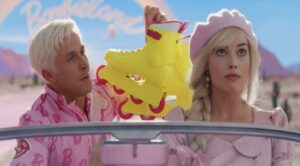You’ve likely heard by now that the Barbie film isn’t a hilarious meta-comedy as it was cleverly marketed to be, and is instead a hyper-partisan comment on patriarchy. Before you decide to dismiss it (or not), there is something about the movie that many viewers noticed that the creators probably overlooked.
Just before the release of the film, Greta Gerwig’s director and Margot Robbie’s lead actress revealed that it was a feminist film. It was true to their word that the film became so feminist, but not the way Gergwig intended.
Ken is the character that we are going to be focusing on, not Barbie. Some people claim that Ken is the true center of the movie.

Barbieland, the real-life setting of the film, is where Barbies are in charge at all levels from the Supreme Court up to the presidency. They live in dream houses with no walls and always look perfect. Kens are another group. In this society, they are considered second-class citizens. They are not in positions of authority, and their primary character trait is to mimic Barbies.
Barbie starts to lose her perfection at some point. She no longer has high-heeled shoes, her feet don’t float when she falls and she starts having dark thoughts. Another older Barbie tells her that she must go to the real world to discover what is happening to herself. Barbie starts her journey but quickly discovers that Ken is with her. His love for Barbie makes him follow wherever she goes.

In the real world, Barbie and Ken are on separate journeys but both learn about “the patriarchy.” Barbie is aware of its evils while Ken has a different perspective. It’s at this point that the tragedy of Ken begins to unfold.
According to a post by X user “Siege”, Ken represents the modern man. Ken is “anxious and confused” and “chasing after women who don’t care about me.”
Siege points out that this discovery causes him to become interested in other things than Barbie, and he starts to explore a world where he is not enslaved to one object. He does not keep this new information to himself but shares it with the other Kens.
This all changes when Ken has an opportunity to leave the longhouse for a taste of the exaggerated patriarchal real-world.
Ken is immediately inspired by the achievements of the Faustian man. He develops a fascination with horses, high IQ professions, and feeling respected.
— 𝕊𝕀𝔼𝔾𝔼🏝 (@6iege) July 24, 2023
Ken frees not only the other Kens but also creates a society that is free of the oppressive matriarchal structure and values both genders. Ken asks the public to vote on the future of our society.
Shakespeare’s tragedy is averted here. Barbie and the older Barbie start the process of “brainwashing”, which the Kens did to the other Barbies, by feeding them feminist propaganda made up from the real world. The plan then is to seduce other Kens and turn them against their Ken by having Barbies seduce other Kens.
The Barbies, while the Kens were distracted by a war/musical number, now have a rigged voting, which gives all the power to the Barbies, and makes the Kens, once more, their simping, subservient lessers. Ken finally gets to be freed from Barbie, and the Kens get a lesser role in government as a punishment. But they are still doomed for subjugation.

Several things should stand out. One thing that should stand out is the fact that when Ken discovered he was capable of more, feminists writing this film viewed this as a negative and made it seem like an ego problem.
Ken’s knowledge was also portrayed as brainwashing by the Barbies, who were all-powerful. It was even compared to “indigenous tribals and polio”. This was not a virus but a few ideas which even the Barbies did not seem to dislike.
Ken had called for a poll, but Barbie was fully indoctrinated and saw it as a negative thing. She tried to manipulate the vote by lying and creating discord within the population. All this was done to restore the matriarchal system which had held down an entire section of civilization.

You can see Ken’s tragic side when you zoom in on the story. He just wants to be more than the dog that lives off of the attention of those who live above him. Not only did he discover that he was more valuable than he thought, but he took this knowledge back to his people so they too could benefit. His plan to free society was a failure due to deceit and tricks. He ended up with less money than he had started.
This is a story that has been smeared with misogyny to make it look like a film with a message of hope for women. What was the positive message? Women are expected to fight men, treat them as garbage and ruin their plans for bettering themselves.
To me, this sounds like the classic self-awareness of modern feminism.




